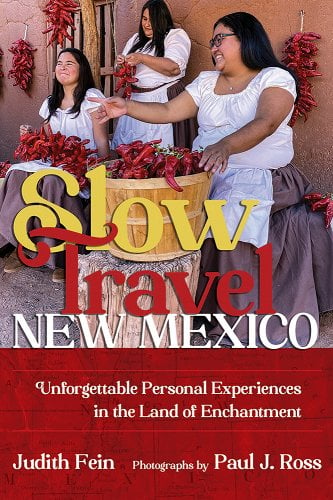
This is an adapted excerpt from the book Slow Travel New Mexico: Unforgettable Personal Experiences in the Land of Enchantment by Judith Fein (2024, University of New Mexico Press)
Slow Travel means that you allow yourself to stop running from site to site and you decelerate so that you can indulge your five senses in the world around you. When you pack your bags, you include imagination and curiosity. You see the people everywhere you go and know that each one carries a special story. You notice details that perhaps no one before you has ever paid attention to. You connect to what you are feeling and what types of learning and exchange enhance your life. You smell the air and can differentiate city from country, mountain from desert floor, forest from beach. You can hear the unspoken nuances when people speak, taste not only the food but the culture of the folks who planted, harvested, and prepared it. You are not just going . . . but also growing.
It seems like an oxymoron, but when you slow down, your life becomes more exciting. No matter what you do or where you go, you begin to discover new aspects of yourself and what is possible in your life. Your attention span increases, you become more curious, your imagination is childlike and boundless, and you start to hear the Velcro of your heart ripping open as it becomes free to feel, explore, and embrace the world around you.
Show up in a place and let it reveal itself to you, on its own terms, rather than planning everything out in advance and meeting it with the reports of other visitors. It’s not about off-the-beaten path. It’s about off-the-beaten mental path — learning to look, see, open up, and explore differently.
Once, when I was giving a workshop to international travel industry professionals, I asked them to write, in ten minutes, what their most vivid travel memories were. Almost all of them told tales like their vehicle breaking down and how locals showed up to help them, connecting with someone with whom they didn’t even share a language, bonding with children, going to a folk healer, buying art directly from the artist, impulsively swimming while in their clothes on a hot day, discovering new and different foods, falling in love with a stranger, getting caught in a storm, seeming misadventures that morphed into unforgettable stories. Although they had been to the top tourist destinations in the world, their unexpected personal experiences made for their greatest memories and stories to tell. And often, their fondest memories included people they met and connected to along the road.
So, how do you become a slow traveler?
1. No Expectations
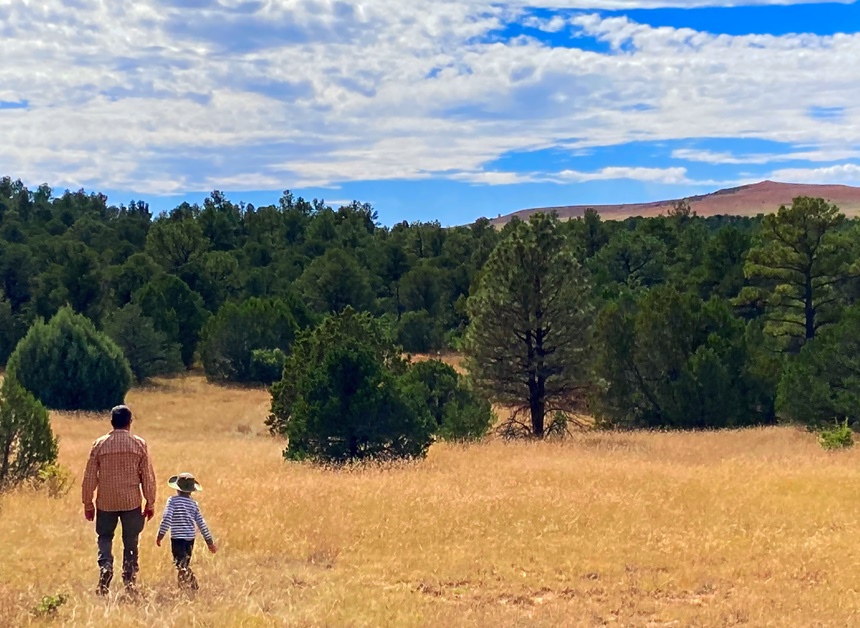
It may surprise you that I do almost no research and generally make no advance plans other than booking accommodations when I travel. I want to be like Marco Polo, Ibn Battuta (often called the Islamic Marco Polo), and Jeanne Baret (disguised as a man, she became the first female to circumnavigate the globe). They had no Internet. They went, they saw, they marveled. Everything was new to them. And when I am on the road, it’s new to me too.
You may be more comfortable planning your itinerary in advance, or you may travel with a group. Whichever way you go, leave room for wandering, discovery, meeting people, exploring beyond the main sites, spontaneity. That is where the trip becomes yours alone, unlike what others may experience.
It is also a great relief to give up expectations of yourself. You don’t have to speak the local language. When you meet a Hispanic person who speaks only Spanish, or a Native American who converses in her mother tongue, either someone will show up who speaks English, or you play a travel version of the game charades, where you mime and use hand signs to communicate. You’ll probably end up sharing a few laughs. And there’s always the backup of a translation program on your cell phone.
You don’t need to know in advance the history, topography, or foods of the place you are visiting. When you do Slow Travel, your mind and ears will be open to listening, learning, paying attention, and discovering all the time. It’s liberating and fascinating to learn from people who live there and whose ancestors, perhaps, passed down stories, information about the land, and ways of preparing and cooking special foods. You may get a grandmother’s recipe for posole, hear the words of a Mescalero Apache medicine man at the end of a moving ceremony, and learn directly from a Crypto Jew about her ancestral connection to the Inquisition. You’ll discover the rich, layered history of New Mexico from guides, locals, and amateur experts.
2. Embrace the Unexpected
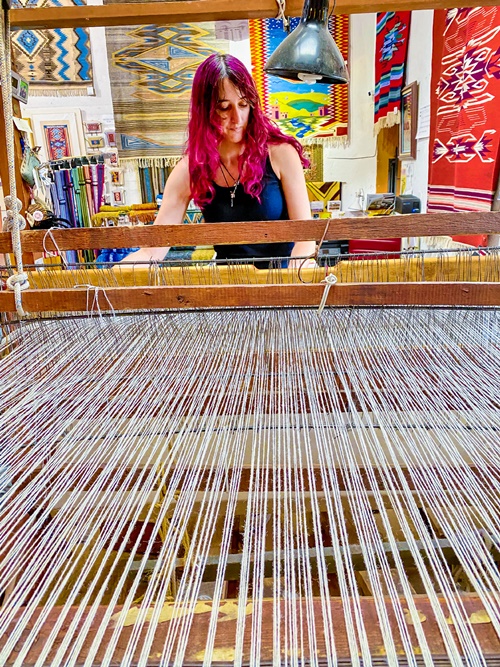
Travel will almost never go exactly as planned. When you head for a specific destination, you may get lost, and when you make a few wrong turns, perhaps you will end up in a fascinating place that you didn’t know about. Or you’ll discover a family restaurant that serves the best enchiladas you have ever tasted. Perhaps you will see a flyer or hear about a fiesta. Unless I have advance reservations somewhere else, I will usually check it out and either postpone or ditch my prior plans. This is how I learned about the three-day, sacred ceremonies at Tortugas Pueblo, and how I ended up visiting the place where animal tracks were made tens of millions of years before the dinosaurs.
When you see something unusual, don’t just pass it by. Stop and find out what it is. That’s how we discovered Whatville in Angel Fire.
3. Be Curious
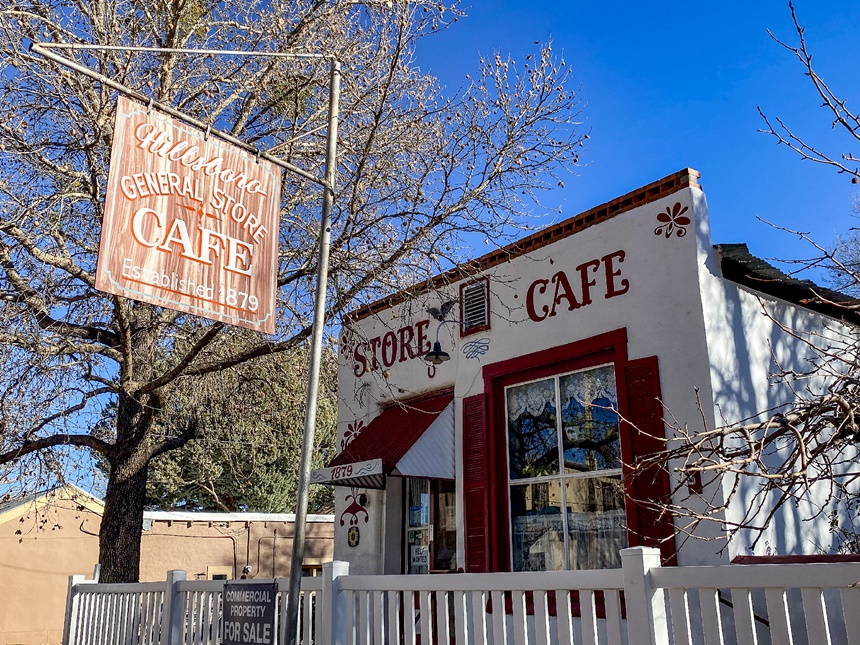
Most of the guides I have met in New Mexico report that people rarely ask them questions.
If I hadn’t asked a guide about the women at Fort Union, I would never have learned about a freed African American named Cathay Williams who changed her name and enlisted as a man or about the requirements for a soldier’s wife before she could come to live with him.
Unless I asked a Navajo artist how to create layers when making a painting, I would never have learned the liberating way he does abstract art.
A friend of mine always says, “If you don’t ask, you don’t get.” Perhaps you will meet someone on the road, and you are dying to ask them questions. Why hold back? Ask politely, and you will likely find out something fascinating. If you are concerned that you may be tiptoeing across someone else’s boundaries, request the person’s permission to ask a question. I’ve never known anyone who refused.
Few people know the important second part of this well-known aphorism: “Curiosity killed the cat. But satisfaction brought it back.”
It can be immensely satisfying to have a deeper exchange with someone. I find mundane discourse to be boring and superficial chitchat maddening. I have rarely been on a guided tour when I had no questions. Learning takes place when we are active and participatory, not passive and removed.
Curiosity about other people and places is a way to expand not only your travels, but also your life.
4. Be Open
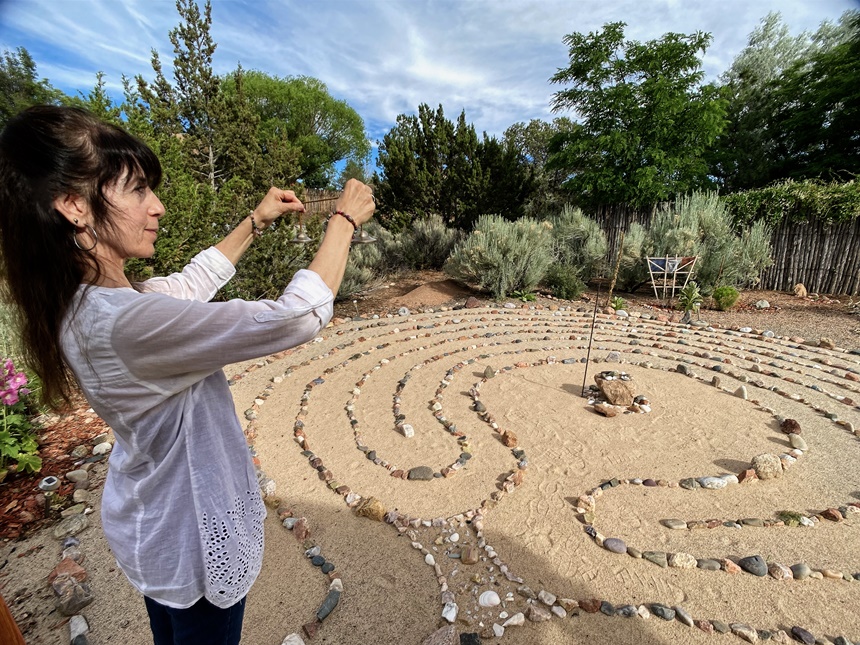
When you say “no,” a door closes. When you say “yes,” it swings open. All of us have likes and dislikes — things we love to do, and those that seem to be of no interest. But what if the latter turn out not to be true? I was not particularly intrigued by going to a ghost town . . . until I saw what I believe was a ghost or an apparition. Opera? I urge you look at it differently, and you may be drawn into that multisensory, psychologically, theatrically rich world. Hiking in an arid riverbed? It may surprise you to get a radically different point of view of the river and the shore.
Try new things: adventures you have a negative idea about, destinations that don’t appear on the surface to match your idea of romantic, luxurious, or worthy of a visit. Discovery is about finding things you didn’t know about before.
In my travels, and in my life, I always try to say “yes,” unless there is a solid reason not to.
5. Be Connected
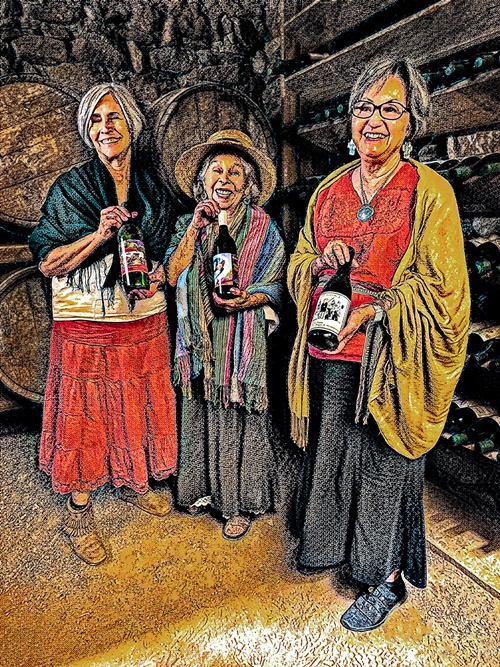
Mike, a young transplant from the Midwest to Mora County, made an indelible impression when he said, “I never met someone who wasn’t my friend.” I think he meant that he approaches people he meets with a friendly, welcoming mind and heart. This is the perfect way to travel.
You will know, of course, if someone, someplace, or something seems potentially unsavory or dangerous. Absent that, life is a smorgasbord waiting to be enjoyed. And people are longing to be seen, heard, acknowledged, connected.
Mitákuye Oyás’iŋ (We Are All Related) is a prayer in the Lakota language. We are all connected, all related, in a web that science calls quantum entanglement. We are all one — two leggeds and four leggeds, those that fly or crawl on the ground, mountains and valleys, trees, plants, and all of life.
It’s a beautiful sentiment I share wholeheartedly.
When you travel, most folks you meet will be happy to tell you about their lives, culture, foods, art, and customs if they think you are really interested. And your world will expand because of it. If you are shy, start by asking them where they bought their embroidered boots or how they prepare a traditional dish. Inquire if they can help direct you to a restaurant they like, or a local market. You may discover that meeting you is an adventure for them too. They may love your accent or ask you about where you come from. You talk, exchange ideas, and a former stranger can easily become a friend.
Become a Saturday Evening Post member and enjoy unlimited access. Subscribe now
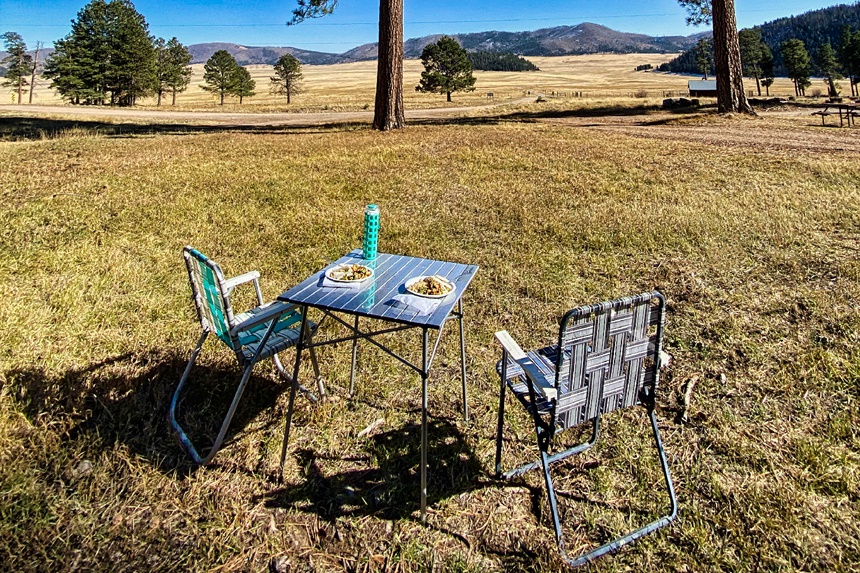

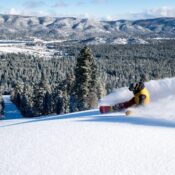

Comments
Thank you Ms. Fein, for this wonderful, unusual travel feature and advice. It sounds wonderful to me. It’s probably not for the majority (of Americans) who only know how to rush, but those willing to take these steps to heart, are in for a nice, relaxing trip. When was the last time you heard those 3 words together? Almost never. The comments before mine are excellent in enhancing the trip taking the roads less travelled, which I’m sure are more scenic.
As a motorcyclist who travels cross country let me add one more recommendation based on my life’s experiences. Stay off the interstates and choose to take roads less travelled. You’ll see, discover and appreciate it more building lasting memories.